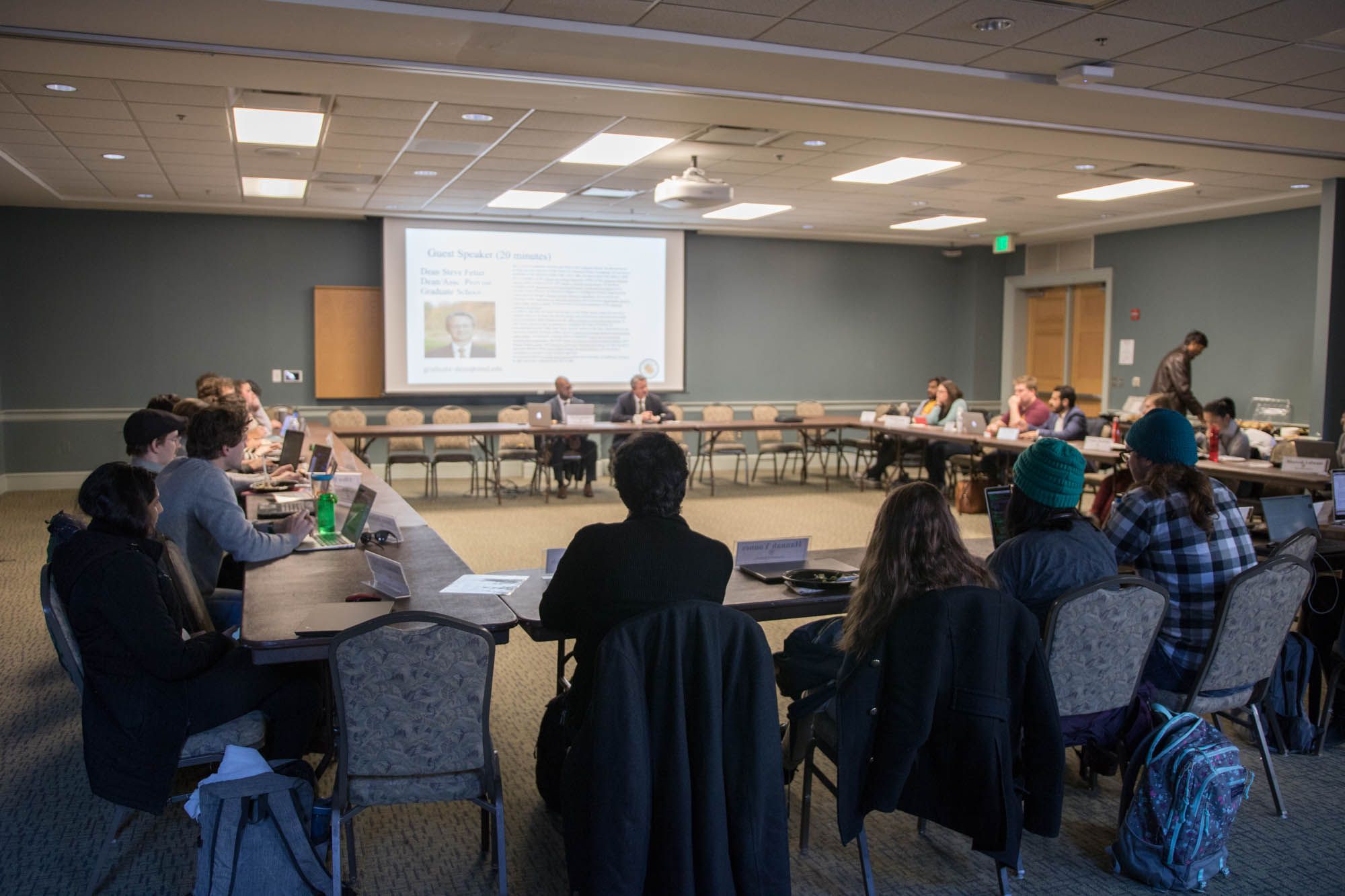The University of Maryland’s graduate school dean reasserted the school’s arguments against collective bargaining rights for graduate student workers on Monday, in front of the students who have been among the most outspoken advocates for them.
In January, the Graduate Student Government voted to support a bill in the Maryland state legislature that would give unionization rights to graduate employees at University System of Maryland institutions and two other public universities in the state.
And earlier this month, GSG members joined other graduate student labor activists in sitting through more than four hours of state Senate hearings for the chance to hear lawmakers discuss the bill.
But in his remarks to the GSG on Monday, dean Steve Fetter echoed the argument he made at the bill’s hearing in the House Appropriations Committee in February: Giving graduate employees collective bargaining rights wouldn’t be good for them or for the school.
“We can address the concerns of graduate students without collective bargaining,” Fetter said.
[Read more: “They don’t care”: UMD GSG says university, USM have been ignoring them]
Communication Representative Katie Brown, who is president of the Fearless Student Employee Coalition, said she hadn’t planned on breaching the subject of collective bargaining with Fetter until she heard him say that the school didn’t use graduate assistants as “cheap labor.”
“It’s cheaper to hire a postdoc to do research or an adjunct faculty member to teach a course,” he said.
In response, Brown told him she was “slightly concerned about the fact that you’ve sort of come into this conversation with the argument that ‘if you think you’re being exploited, we could exploit you more.’”
Fetter replied that giving collective bargaining rights to graduate student workers would take away the graduate school’s ability to resolve issues on a “one-on-one” basis with the students, and would instead force the school to engage with a union representative. He added that graduate student workers would be in danger of losing money — they’d have to pay dues if they were part of a union.
Fetter also said that the graduate school has addressed concerns raised by the Graduate Assistant Advisory Committee, the body that represents the school’s more than 4,000-plus graduate assistants.
[Read more: Some UMD faculty live in poverty. A state bill would expand their union rights.]
In January, graduate employees at this university, along with state workers, got a 2 percent cost-of-living adjustment. They received an additional 0.5 percent adjustment as of Monday.
Fetter added that another 3 percent adjustment is in the state’s budget for next year, and the minimum stipend might increase by another 4 percent in July, subject to the availability of funding.
This would bring the minimum stipend for a 9.5-month assistantship to $18,800 — a sum equal to what Fetter said the student financial aid office estimates to be the cost of attendance for a graduate student.
The number of fellowships offered to graduate students, as well as the amount of money offered, will also increase for next year, Fetter said, and last fall, the school started requiring faculty supervisors to meet with their graduate assistants at the start of each semester to discuss the duties they’d be expected to fulfill.
Fetter added that a survey conducted by the graduate school in October found a “fairly high degree of compliance overall” with the new policy. Of the 1,279 graduate assistants who were surveyed, about 73 percent reported having an expectation-setting meeting with their supervisor.
While the time allotted for Fetter’s presentation ran out before Alexander Dennis was able to press him on the subject, the business and management representative noted during the representative forum portion of the meeting that compliance is notably low at some schools.
At the engineering school, only 56 percent of graduate assistants who responded to the survey reported having a meeting with their adviser. At the computer, mathematical and natural sciences college, it was 63 percent.
“What is the graduate school doing to basically yell at the department heads to actually do this and what more could they do?” he asked.
Assistant graduate school Dean Jeffrey Franke jumped in to tell Dennis that the graduate school is currently working with the Office of Faculty Affairs to set up training sessions for faculty on mentorship of graduate students.
“The problem is, if you start forcing the faculty to do it, it backfires on you sometimes,” Franke said. “We’re trying to change the culture in a way so [having expectation-setting meetings] becomes more of a habit than opposed to checking off boxes.”
Physics representative Zachary Eldredge said he worries that expectation-setting meetings won’t be as beneficial without further structure. The faculty members whose assistants would gain the most from these meetings, he said, are the ones who would avoid having them.
With collective bargaining rights, graduate student workers could write up contracts with faculty members. But since these employees don’t have these rights, Brown said GAAC and the FSE will be working with groups of graduate assistants in various departments to build on the sample document the graduate school has already made available to make sure it addresses the most pressing needs for graduate workers.
She added that they’ll also be talking with workers about how best to approach expectation-setting meetings, and collecting data on who is and isn’t filling out the documents.
“For us to be able to move on this, we have to make a little bit of noise about it and we have to enforce them from on our end,” she said.



